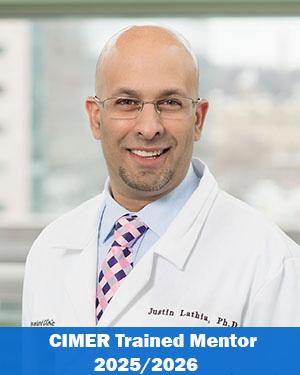Research News
09/14/2022
Cleveland Clinic MD-PhD Student Identifies Potential Therapeutic Target for Glioblastoma
The research in Dr. Justin Lathia’s lab clarifies SerpinB3’s role in preventing cancer stem cell death, could lead to more effective radiation therapies.

Targeting the protein SerpinB3 could make glioblastoma treatments more effective, based on Cleveland Clinic research recently published in Cell Reports.
Researchers at the Lerner Research Institute found that suppressing SerpinB3 limited tumor growth and formation, and made cancer stem cells more vulnerable to radiation in a series of experiments. The findings highlighted a novel way that tumors resist treatment.
“We bumped into SerpinB3 as a potential factor almost by mistake in investigating cell death” says Adam Lauko, PhD, first author and third-year Cleveland Clinic MD-PhD student. “Further understanding of how cancer cells use SerpinB3 to resist cell death could translate to more effective treatments.”
Glioblastoma, one of the most common and deadly brain malignancies, is often extremely resistant to treatment. The disease has an average survival time of 12 to 18 months and a five-year survival rate of 7%.
Radiation affects a cell’s DNA to kill off cancer cells and cause tumors to shrink. Cancer stem cells in glioblastoma have the ability to self-renew, meaning the cells can divide to make new tumors or repair. To further understand how cancer stem cells survive stressful environments and resist treatment, researchers looked at lysosomal permeability, an “understudied trigger” for cell death.
The lysosome is the part of the cell containing digestive enzymes. The organ leaks when its membrane breaks open, potentially killing the cell. One of those substances, cathepsin L, is already a potential therapeutic target for cancer treatment. The study’s findings showed that standard-level radiation can cause lysosomal cell death in glioblastoma.
Along with being associated with progression in other cancers, including head and neck and cervical cancers, SerpinB3 is shown to inhibit cathepsin L. Researchers saw greater cell death rates during treatment once the protein was suppressed. To test further, researchers introduced a mutant version of SerpinB3 that does not have the ability to inhibit cathepsin L. The mutated protein was unable to rescue cells from cell death.
These findings lay a foundation for further exploring SerpinB3 as a therapeutic target, says Justin Lathia, PhD, Vice Chair of the Department of Cardiovascular & Metabolic Sciences, Co-director of the Center of Excellence in Brain Tumor Research and Therapeutic Development, and the Melvin H. Burkhardt Endowed Chair for Neuro-Oncology at Cleveland Clinic. That includes developing a SerpinB3-specific inhibitor and figuring out whether the findings apply to other brain tumors, he says.
The research was conducted in the Lathia Lab in collaboration with Shideng Bao, PhD, Director of the Lerner Research Institute’s Center for Cancer Stem Cell Research and Jennifer Yu, MD, PhD, staff. Funding was sourced from multiple National Institutes of Health grants.
Featured Experts
News Category
Related News
Research areas
Want To Support Ground-Breaking Research at Cleveland Clinic?
Discover how you can help Cleveland Clinic save lives and continue to lead the transformation of healthcare.
Give to Cleveland Clinic